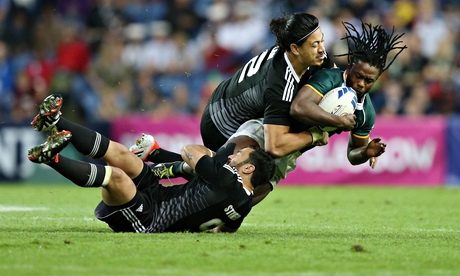
On the fourth day the Games came to Ibrox, emerging from the indoor arenas into the bright lights of the big stadia. The pool at Tollcross has been busy, the Scottish Exhibition and Conference Centre heaving and the stands at the velodrome packed tight but nothing has compared with this.
They sold 186,000 tickets for the sevens, split between four sessions. The noise was like nothing else that has been heard here yet, so loud it was almost painful for ears grown accustomed to the sound of smaller crowds in smaller venues. “Bada-ba-dada-ba-dada-da-dum,” come the drums over the sound system, followed by the low oompahs of the brass. “Here they come! It’s the Cook Islands! And Barbados!” And, hard as this may be to believe, 40,000 people start to scream and shout and stamp their feet. Twelve hours later, at the far end of a long day, the tournament had a fine finale. South Africa beat New Zealand 17-12, thanks to two tries from Seabelo Senatla and a third from Cecil Afrika.
The International Rugby Board’s chief executive, Brett Gosper, spoke this week about the pressure on sevens “to get it right” when the sport makes its Olympic debut in Rio in 2016. The year after those Games are over, the International Olympic Committee will vote on whether to include it in the 2024 edition. In Glasgow the organisers got it right, in an utterly, gloriously, bonkers way.
It has been one weekend-long party in the west of the city. On Saturday they had a marriage proposal in the middle of the pitch. James Collette, a soldier just back from Afghanistan, had arranged it all with the organisers beforehand. He and his girlfriend, Lucy Sargison, were called down to the pitch to take part in a quiz. Her first question was: ‘Will you marry me?’ Luckily, she knew the right answer.
At one point on Sunday morning there was a 40,000-strong sing-a-long of Sweet Caroline. It is one of those rare instances when all the gimcracks and gimmicks – the ear-splitting soundtrack, the drunk blokes running in human hamster wheels, the big screen invitations to play the bongos or kiss the person next to you – only add to the occasion. Not that the atmosphere particularly needed the artificial enhancement, what with Scotland playing England in plate semi-finals.
Some of the Scottish fans, like the weather, reverted to stereotype and the warm welcome offered to the English athletes elsewhere did not extend to the rugby field. The Scots were supporting anyone – everyone – else. They took a particular shine to Uganda, who took a 10-minute lap of honour after being battered 32-0 by Canada. Between them they must have shaken hands with every single person in the front row of seats.
England beat Scotland, though they considered a place in the plate final a poor prize. It was a shame more was not at stake but all three home nations were knocked out in the quarters. Scotland were stuffed by South Africa. So the spectators adopted the Samoans, who lost the bronze medal match to Australia but beat England along the way, thanks to a superb try by Sam Lio Lolo.
Wales managed to lose to Australia despite being 19-0 up at half-time. They were still ahead when the klaxon went but Australia managed to travel the length of the field and score in the corner, transporting one poor Welsh fan from a fit of giddy celebration to an explosion of foulmouthed cursing in the space of a few seconds. A similar thing happened to his team in the plate final, only this time it was England’s captain, Philip Burgess, who scored in overtime to win the game.
Sevens can do that. Its speed is one of the many qualities that make it so suitable for a multi-sport tournament, along with its simplicity, spectacularity and popularity with corporate sponsors. Like T20 cricket, sSevens cuts away a lot of the aspects that the connoisseurs like and leaves behind the bits that casual fans love.
The IOC, and possibly the IRB, would probably be even happier if they could make the game still more appealing to the general public by getting some famous names involved – other than Billy Ocean, whose son was playing here for Barbados (yes, the going got tough, no, the tough did not get going – they shipped 248 points in five games) – more the likes of Stuart Hogg and Sean Lamont, two of the more marketable Scottish players, who were both in the squad here. It will be interesting to see how many more stars from the 15-a-side game are tempted to switch across and join the specialists in the run-up to Rio.
Any who do will find it harder to adjust than Jonah Lomu, Christian Cullen and David Campese did when they turned out for sevens’ debuts at the Games at Kuala Lumpur in 1998. These days there is little to choose between the top teams, whose players are all honed by their experiences on the world sevens circuit. Samoa, Kenya and Canada are all strong sides and, minnows aside, most of the teams here seemed capable of beating each other – with one exception. The All Blacks had become the closest thing to an irresistible force in all of sport. Going into the final their record in the Commonwealth Games read played 30, won 30. And then they met South Africa and the superb Senatla.

